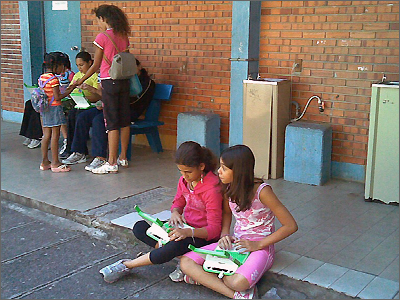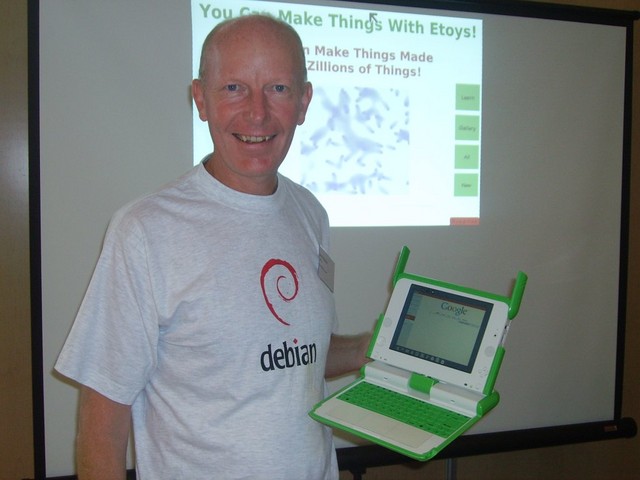One Laptop per Child
The One Laptop per Child project has got a lot of attention, has prototype hardware, and a lot of open source software. What are its prospects in Africa ?
Antoine managed to get one of these to show off as he is writing code behind the ‘view source’ button, and Morgan and Jonathan of our local Linux uses group have all blogged about it.

There are a lot of things to be said about the OLPC project. The first thing to note is that it is not a new initiative - there have been others, under different names, for a long time. Seymour Papert invented Logo, a programming language targeted at children, and Alan Kay was the conceiver of the Dynabook concept which defined the basics of the laptop computer.
- It is meant to be inexpensive ($175 and climbing) with mass-production driving the price down. Currently the minimum order is 250,000..
- It is targeted at Third World countries, though there has been some takeup from first world
- It is unambiguously for kids - with a Fisher-Price toy appearance
- It is an Open platform - no part of the design is ‘secret’, and drivers are available for all the pieces
- Development is furthest ahead using a variant of Red Hat Linux
- It has no moving parts, like fans or CDs or hard drives - for ruggedness
To bypass the retail chain, it is intended that countries sign up. After they have signed up, a production run tailored to their requirements is made, targeting all children in the country. Seven nations have committed to buy the XO-1 for their schoolchildren, including Argentina, Brazil, Libya, Nigeria, Rwanda, Thailand and Uruguay. Look, 3 African countries right there! I notice today that Uruguay has started rolling out, with President Tabaré Vazquez. personally handing out 160 laptops The national telco ANTEL will be providing connectivity.
Activities, not Applications
Activities are primarily self-contained - no Internet access is assumed. However, the laptop has wireless capability, aimed at mesh networking with other OLPC laptops. Talking of features, the OLPC laptop has the following:- Wikipedia
- 1Gig Flash memory (storage - disk replacement)
- 256 Meg RAM
- Color screen, special low-power monochrome mode
- Wirelss - 802.11 A/B/G
- Two USB ports
- SD card slot
So much for ‘our’ side of it - how is this going to go over in Africa ?
OLPC is based on constructionist learning theories pioneered by Seymour Papert, Alan Kay, and also on the principles expressed in Nicholas Negroponte’s book Being Digital.

The OLPC philosophy is definitely around self-directed learning. The laptops are being given to the children primarily to stimulate them to explore and use. It netwoks - there are four ‘views’ on the desktop - a full-screen single Activity, a Desktop view showing all the currently-running activities, a ‘friends’ view with icons representing invited friends, and a ‘world’ view showing the whole visible network. Activities may be single-user or may involve other children on their laptops.
In my experience of computers in Africa, children are definitely able to explore a computer desktop without help. Little or no instruction is needed to show them how to use a keyboard and mouse, and they quickly become proficient as they gravitate towards games provided. It can be quite intimidating for a teacher to realise that her students will quickly know more than her. I have been at schools where it seems easier to the teacher to lock up the computer room than deal with situations that are not entirely under their control.
African society is more hierarchical than our society, and to disturb that structure could cause problems. A lot of what westerners admire about africa is observed benefits of living in a larger family - a consensus-based society. I do think a lot more effort needs to be directed at getting teachers involved. In the townships and the countryside - if authority is bypassed then authority will just put out a leg and trip the project flat on its face.

But there are other sides - the heirarchy favours the status quo, making it difficult to effect real change. Rape victims are shunned by their families, and they realise they don’t need the man in their life any more. They need the sort of instruction that a portable wireless computer with occasional internet access can give them, the Web 2.0 read-write culture. Access to information, and the ability to write and be heard.
People in the West know what it is like to have that, and can see immense benefit in a communications infrasructure that is free.
More details
There are some cool geeky things, like the OpenFirmware forthboot shell from solaris, a completely vector based graphics toolkit to allow for screen improvements in the future. Python is the language of choice, and Squeak, based on Smalltalk a clean and simple object-oriented language.
The founding corporate members are Google, News Corp, AMD, Red Hat, Brightstar and Nortel, each of whom donated two million dollars to the project. Papert, Kay, Negroponte and the six companies are active participants in OLPC.